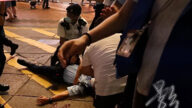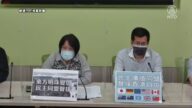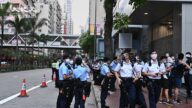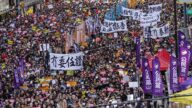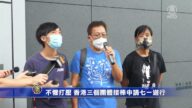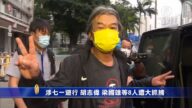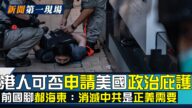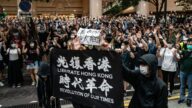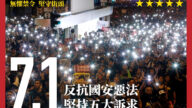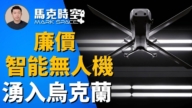【新唐人2014年07月09日讯】日前,“香港记者协会”发布《2014年言论自由年报》,《年报》指出,香港新闻自由陷入数十年来最黑暗的一年,“新闻自由,危城告急”。另外,“记协”还成立了“自我审查监督委员会”,接受业界投诉。要让公众知道香港的新闻自由受到多大威胁。
“香港记协”主席岑倚兰在7月6号发布的《2014年言论自由年报》记者会上,以“危城告急”为题发言,她指出,从去年年中至今,香港传媒饱受打压。
香港记协主席岑倚兰:“我们已经觉得,香港新闻自由已经陷入数十年来最黑暗的一年。”
岑倚兰表示,香港每天有超过300万份报纸发行,但以前多元化的声音现在变得单一,特别是今年,中共在各个方面对传媒进行干扰和打压。
岑倚兰:“很多报纸对于一些敏感的问题就不登了,在每一个重要的事件期间,香港新闻界就会首当其冲受到影响,影响媒体的导向、影响言论,它(中共)要争取舆论的空间。我们看见香港的新闻自由有退吧。”
“国际记者联合会”香港和中国区代表胡丽云表示,今年前半年,香港传媒界的真实情况非常糟糕。
国际记者联合会香港和中国区代表胡丽云:“不但有一些媒体人(被)取消他们的工作机会,也有一些广告商,因为政治的缘故,停止在一些敢言的媒体里面登广告,更重要的就是有一个老总给人攻击,在今年出现的那么密、那么多、那么明显的事情,我们觉得非常给人有一个忧虑的状态。”
总部位于法国巴黎的“无国界记者”组织,今年2月12号公布的“2014年全球新闻自由度报告”显示,香港的新闻自由度排名持续下跌,已由2002年的18名暴跌到61名。
今年2月,香港《明报》前总编辑刘进图被暴力袭击之后,还发生《香港商业电台》主持人李慧玲突然被解雇,另有身处高位的新闻工作者被撤换、香港《苹果日报》和《am730》报纸被抽走广告,以及港府拒绝发放免费电视牌照给香港电视网络等事件。
香港资深媒体人潘小涛对《自由亚洲电台》说:“刘进图被撤换的时候,我们说已经够糟糕了﹔李慧玲被换走(开除)的时候,我们说应该是最黑暗的时候了﹔刘进图被砍,我们说连暴力都出来了!到这几天,《明报》他们的编务董事可以插手改头版头条(标题)。这是史无前例的,把整个制度给破坏了。”
日前,《明报》编务董事吕家明,在没有通知主编及其他编辑部负责人的情况下,擅自叫停已在印制的报纸,并将原有报导香港“七一游行”的标题﹕“争取普选”删除,并改为“警察清场”,引发业界谴责。
“国际新闻工作者联合会”(IFJ)4号发表声明,谴责香港《明报》高管人员删改“七一大游行”报导内容,是违背新闻自由准则。
“香港记协”前任主席麦燕庭向媒体表示,吕家明删改报导显然是新闻审查。
“香港记协”表示,有鉴于新闻界自我审查日渐严重,“香港记协”成立“自我审查监督委员会”。
岑倚兰:“我们主要成立的目地是,用客观中立的态度,来观察香港媒体里面自我审查的情况,提高公众对香港媒体自我审查情况的关注,提高警觉。”
岑倚兰表示,今年“香港记者协会”做了一个有关香港新闻自由指数的一个调查,发现自我审查在香港情况严重。
岑倚兰:“中国是一个跟香港的制度很不一样,中国是共产党参与的、主政的,它们的意识形态跟香港生活制度方面很不一样,观念上也不一样,新闻主要是宣传的很重要的目地。”
岑倚兰说,新闻自由在香港很重要,如果没有新闻自由,香港就没有真相,香港人的知情权也就更没有了。
采访编辑/易如 后制/李勇
Hong Kong Journalists Association Calls 2014
the Darkest Year for Press Freedom
The recently released 2014 Press Freedom Annual Report
by Hong Kong Journalists Association (HKJA) indicated
that 2014 has been the darkest for press freedom
in Hong Kong for several decades.
“Hong Kong’s press freedom is under siege,” it read.
In addition, HKJA announced the establishment
of the Self-censorship Monitoring Committee to accept
complaints from media outlets so as to let the public know
how much threat Hong Kong’s press freedom is under.
In the 2014 Press Freedom Annual Report press conference
on July 6, HKJA chairperson Sham Yee Lan gave a speech
entitled, “Press Freedom Under Siege.”
She pointed out that Hong Kong media has been
under intense pressure since mid 2013.
Sham Yee Lan: “We reckon that Hong Kong’s press freedom
had its darkest year in several decades.”
Sham Yee Lan said that over 3 million copies of newspapers
are published in Hong Kong per day.
But the diversity in the past has become monotonous,
in particular this year.
China has suppressed and interfered with Hong’s media
in various aspects.
Sham Yee Lan: “Many newspapers do not carry the news
regarding some sensitive issues.
During the period when an important incident occurs,
Hong Kong media will bear the brunt of the impact.
It affects media’s direction and the freedom of speech.
It (China) is struggling to gain more room to control public
opinion.
We have seen a retreat in Hong Kong’s press freedom.”
Hu Liyun, International Federation of Journalists (IFJ)
representative in Hong Kong and China, says that
Hong Kong’s real mass media situation in the first half
of the year was very bad.
Hu Liyun: “Not only were some journalists’ working
opportunities cancelled, but some advertisers stopped placing
advertisements on some outspoken media due
to political reasons.
What’s even worse is that some publishers were attacked.
As there have been so many things happening publicly
in such a short period of time this year, we think it has put
people in an anxious state.”
According to the 2014 World Press Freedom Index released
by the Paris-based Reporters Without Borders
on Feb. 12, 2014, the ranking of Hong Kong’s press freedom
has continued to fall, dropping to 61st among 180 countries
and regions from 18th in 2002.
In February this year, ex-chief editor of Hong Kong’s
Ming Pao, Kevin Lau, was violently attacked.
Many news and media bodies in Hong Kong
have also met with similar misfortune.
The news anchor of Commercial Radio Hong Kong was
abruptly fired along with a few other high ranking employees.
Hong Kong’s Apple Daily and AM730
had their advertisements removed by their clients.
Last but not least, Hong Kong Television Network’s
application for the Hong Kong domestic free television
program service license was rejected
by the Hong Kong government.
Senior Hong Kong media news person Poon Siu To
told Radio Free Asia, “When Kevin Lau was dismissed,
we said it was bad enough.
When Li Huiling was dismissed,
we said it was probably the darkest hour.
But when Kevin Lau was stabbed by assailants,
we proclaimed that even violence has taken place!
These days, the director of editorial operations of Ming Pao
could freely interfere and amend in the headlines.
This is unprecedented and it destroys
our entire media system.”
Recently, the director of editorial operations of Ming Pao,
Lu Jiaming, ordered the termination of newspapers
that were already under printing without any prior notice
to the chief editor as well as other editorial coordinators.
Further, he deleted the original title of the Hong Kong
July 1 parade report.
The original title, “Striving for Universal Suffrage”
was deleted and replaced with “Police Cleanup at the Scene.”
This action was widely condemned
by the Hong Kong news industry.
The International Federation of Journalists issued
a declaration on July 4 criticizing high ranking personnel
of Ming Pao for the amendment of the report
on July 1 protests.
The IFJ declared that such an act contravenes
press freedom principles.
Ex-chairperson of the Hong Kong Journalists Association,
Mak Yin-ting, said that Lu Jiaming’s change in the news
report is clearly an act of news censorship.
Hong Kong Journalists Association expressed the concern
over the growing self-censorship in the news arena
and swiftly established the Self-censorship Monitoring Committee.
Sham Yee Lan: “Our main objective in setting up the council
is to assess the self-censorship situation
in Hong Kong media from a neutral
and objective point of view.
We wish to promote public concern and awareness
in the situation of self-censorship of Hong Kong media.”
Sham Yee Lan also indicates that the Hong Kong Journalists
Association investigated the press freedom ratings
in Hong Kong earlier this year.
The investigation revealed that the self-censorship situation
in Hong Kong was grave.
Sham Yee Lan: “China has a very different regime
from Hong Kong.
China is under the dictatorship of the Communist Party,
their thought paradigms and their lifestyles
differ from that of Hong Kong.
They also have different preconceived ideas and notions.
In China, propaganda is a very important objective
of news media.”
Sham Yee Lan emphatically stated that freedom of press
is very important to Hong Kong.
Without freedom of press, Hong Kong will have no truth.
It also means that Hong Kong people’s right to information
will be rendered illusory.
Interview & Edit/YiRu Post-Production/LiYong


